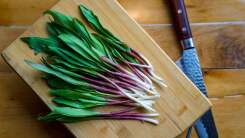Why You Should Blanch Your Vegetables Before Freezing Them
Buying vegetables in bulk is a good way to save money on already cheap (or not so cheap) vegetables. Many of them will keep for weeks in a cool, dry place, but even the most zealous vegetable enjoyer can find themselves with too much of a good thing. In moments like these, you turn to your freezer.
But unlike ginger or even tomatoes, chucking raw vegetables like carrots or broccoli into a plastic freezer bag and popping them into the icebox is not enough. Doing it that way can adversely affect the vegetable’s flavor, texture, and even color. To ensure your veggies remain as good as possible for as long as possible, you need to blanch them first.
In her article about freezing carrots, professional home economist Getty Stewart explains that blanching is more effective at stopping enzymatic action (which “ages” the carrots) than freezing alone:

Carrots, like most vegetables, contain enzymes that cause them to continue to age after they’re harvested, even in our fridge. The aging process does not stop in cold temperatures – even freezing temperatures. To stop the enzymes and preserve flavor, color, texture and nutrient loss, you need to
blanch veggies
, including root vegetables like carrots, before freezing. Luckily, blanching is super easy to do.
Blanching is super easy. All you have to do is briefly cook the vegetable in boiling water or steam, then plunge it into an ice bath to stop the cooking process. Doing so stops the enzymatic action that can lead to a loss of flavor, color, and texture.
The timing, however, is important. According to the National Center for Home Food Preservation, over- and under-blanching can cause their own set of problems:
Blanching time is crucial and varies with the vegetable and size. Under-blanching stimulates the activity of enzymes and is worse than no blanching. Over-blanching causes loss of flavor, color, vitamins and minerals.
Luckily, they have a handy blanching time chart can consult to avoid either of these terrible fates (scroll down to the bottom of this page). Once your vegetables have been boiled for the appropriate amount of time in unsalted water, place them in an ice bath for as long as they were blanched, then dry them completely using clean kitchen towels or a salad spinner. Lay them out on a baking sheet or large plate, then freeze before transferring to a bag for longterm storage. Most blanched vegetables will keep in the freezer for up to a year and can be cooked straight from frozen without thawing (the blanching actually cuts down on cooking time).
RECOMMENDED NEWS

Admit It—Not Every Sandwich Needs Cheese
A couple of years ago, I saw a video featuring a British sandwich artist named Max Halley who refuse...

Why Not Rotisserie Your Own Chicken?
During the height of the pandemic last year, a lot of us looked to our own kitchens to replicate the...

Scruffy dog looks longingly at a mango popsicle that has been seasoned with Tajin.
I don’t know how up-to-date you are on the latest and greatest popsicle news, but Outshine is now ma...

This Four-Ingredient Onion Gravy Makes Any Dish Cozier
People love to talk about “sweater weather,” but—to me—the changing leaves and dropping temperatures...

The Trick to Fixing a Broken Buttercream Frosting
It might look like fluff, but buttercream frostings are delicate emulsions. When chilly temperatures...

The Right Way to Take a (Wild) Leek
It is ramp season, the season that propels even the most calm and reasonable eaters into a slight pa...
Comments on "Why You Should Blanch Your Vegetables Before Freezing Them" :